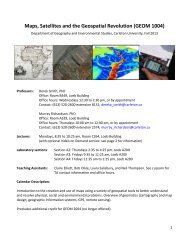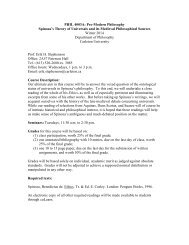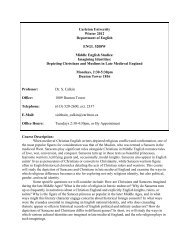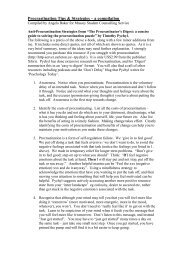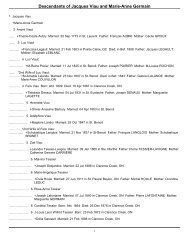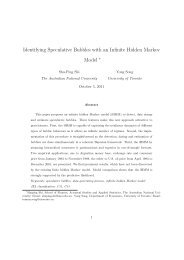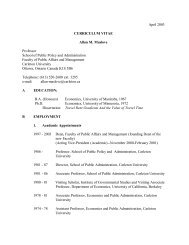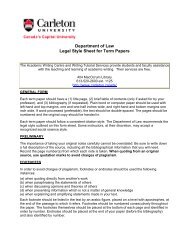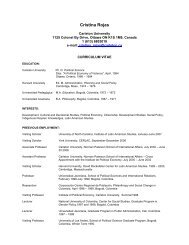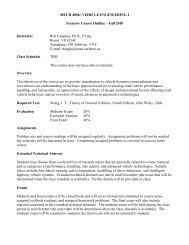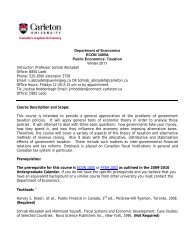anthropocene ethics: rethinking 'the political' after environment
anthropocene ethics: rethinking 'the political' after environment
anthropocene ethics: rethinking 'the political' after environment
- No tags were found...
Create successful ePaper yourself
Turn your PDF publications into a flip-book with our unique Google optimized e-Paper software.
none the less the basis of this is an ethic of not externalizing the costs of consumption by imposingdisruptions, toxics or pollution on others.But the more traditional concerns with <strong>environment</strong> as the rural, the surrounds of the cities, thebackdrop to metropolitan life, also need attention. But in so far as the first principle above, that ofreducing material throughputs, is followed some of the pressures on rural lands, waters and biodiversitywill be reduced. But that said it is clear that a seventh principle is needed that encompasses the crucialpoint about trying to maintain ecological diversity where at all possible to keep future options open.Agriculture has long been a major factor in the disruption of habitat, a category related to enlightenmentnotions of wilderness as unproductive and the need to improve land to make it valuable. But suchdichotomies are now rendered impossible by Anthropocene thinking. Habitats are key to maintainingecological diversity and need to be understood as essential to the health of any species; they are real genebanks which facilitate innovation, adaptation and evolution, unlike the stasis of artificial storage proposedby many technically focused discussions of diversity preservation. But they need to be interconnected sothat animals, birds and plants can move and adapt to changing circumstances. Artificial linear barriers likeroads, and areal barriers like cities and fields, compromise mobility in dangerous ways for many species.Put together these in sum amount to an ethic of care directed to life, something akin to an ethic offlourishing in Cuomo's (1998) terms. Most important is the cultural dimensions of these insights. Sauron'sfantasy of complete domination and perpetual power, the hubris of imperial aspiration is the industrialfantasy of modernity, of the whole world as malleable to a single will. But if the understanding ofinterconnection is to be fostered the cultural tools necessary are at least in part being forged in the postindustrialtechnologies of representation and communication. While so much of the ephemeralconsumption online is just that, nonetheless the importance of the ephemeral connection is crucial both tothe possibilities of <strong>rethinking</strong> politics, and the possibilities of <strong>ethics</strong> that understand that the distant unseenstranger and the distant unknown field or factory, is irremediably tied into who we who "log on" actuallyare. Languages of complexity theory and ecological interconnection provide alternative modes ofunderstanding that transcend the metaphysical formulations of autonomy and separation as liberal ontotheologicalaspiration (See Dalby, 2003b).Above all Anthropocene thinking requires that the contemporary discussions of global changeand globalization be merged into one. The flows across boundaries, of people, materials, fuel andpollution that are the source of concern to many who study "globalization" are precisely the processes thatare forcing the biospheric system in the new ways that so worry scientists working with the IGBP.Ironically this pattern makes more sense if matters are viewed in terms of the imperial dimensions ofglobal trading where peripheries supply the raw materials for production plants that provide thecommodities for the metropoles (Dalby, 2003c). Shadow globalization and the disruptions caused by theexpansion of modernity into remote parts of the world's polity (Jung, 2003), is an important part of whatthe destruction of the "wild" is all about (Sanderson, et.al. 2002).But the question of the political forms of sufficiency remain important too; as Peter Stoett (2003)notes the centralized security state is a requirement for the reintroduction of nuclear power as a legitimateenergy supply system, a political campaign spurred on by the use of global warming concerns. In so far asstates function to secure consumption and the supplies of resources through the global economy they arefrequently intensifying the changes in the flows of materials through ecological systems. Road building,and the promotion of car culture as a development strategy in many places, is only the most obviousmanifestation of this political difficulty; states are building the infrastructure that is changing thebiosphere. Expecting them to regulate <strong>environment</strong>al matters effectively so long as this remains theirdominant goal is not the basis of either an effective domestic strategy or regime building (Paterson, 2000).Intelligent land use planning remains but a dream in the suburbanization of many places wheredevelopers' prerogatives so frequently hold sway in municipal politics (Davis, 2002).The overarching requirements of Anthropocene thinking suggest principles very considerablydifferent from the contemporary focus in neo-liberalism on self-governance, international efficiency andthe whole technocratic panoply of mechanisms of ecological modernization. Tom Princen (2003) suggeststhat the theme of sufficiency is an essential prerequisite for reforming international <strong>environment</strong>al10



